- Home
- Jim Eldridge
Murder at the Ritz Page 2
Murder at the Ritz Read online
Page 2
‘The activity may be illegal, but it’s a private club on private premises.’
‘So?’ demanded Lampson. ‘Two clubs in Soho were shut down last month for that sort of thing.’
‘True, but I expect those two clubs didn’t have the same kind of influential people among their clientele,’ said Coburg. ‘The Pink Sink is the haunt of some very high-ranking military types, not to mention MPs and top civil servants, as well as lesser ranks and waiters and such.’
‘Disgusting!’ snorted Lampson. ‘They ought to arrest ’em all.’
‘If they did that, half the military top brass and a quarter of the Cabinet would be in jail,’ said Coburg.
‘How come you know so much about it?’ asked Lampson suspiciously.
‘Before the war, I had friends for whom the Ritz was their home from home. Not the Pink Sink, rather the Palm Court and the Rivoli bar, which is where the straights gather, but I learnt what went on. You never know when it might come in useful.’
Lampson nodded. ‘Like now. So d’you reckon this dead bloke was one?’
‘It’s possible,’ said Coburg. ‘But if so, the question is, what was he doing in one of the Albanian royal family’s suites?’
‘He could be Albanian,’ said Lampson.
‘He could indeed. We’ll get a photograph of him and pass it around the King’s retinue, see if anyone recognises him. In the meantime, let’s go and have a word with George.’
‘The hall porter?’ asked Lampson. ‘What will he know?’
‘Everything,’ said Coburg with a smile. ‘He’s much more than just your regular hall porter. He’s been here as long as I’ve been coming here. He’s known affectionately as George of the Ritz across four continents. He’s trusted by everyone, the guests as well as the hotel management. Royalty, millionaire businessmen, politicians – they all know and trust him. And there’s nothing that goes on in this hotel he isn’t aware of.’
Returning to the lobby, Coburg telephoned Scotland Yard asking for a photographer to be sent to take some photos of the dead man. ‘And as soon as you can,’ urged Coburg. ‘Send Duncan Rudd if he’s free.’ He replaced the receiver and turned to the hall porter.
‘Once we get some pictures of him we’ll be able to move the body and return your hotel to you, George,’ Coburg told him. ‘As soon as the photographer arrives, can you put a call through to University College Hospital and ask them to send an ambulance to pick up the body? Quote Dr Matthews’ name. They’ll know the drill.’
‘Will do,’ said George.
‘Thank you,’ said Coburg. ‘One last thing. What can you tell us about King Zog and his retinue?’
George shot a wary and inquisitive look towards Lampson, to which Coburg said: ‘I assure you, George, Ted is the perfect image of confidentiality. I’d trust him with my life.’
Reassured, George nodded, then told them: ‘As you probably know, King Zog is the dethroned King of Albania. He and his family fled their home country last year in the spring just a day before Mussolini’s troops invaded. They’ve journeyed throughout Europe and ended up in Paris, managing to escape to London just before the Germans invaded. I believe they were helped to flee by a British Intelligence officer, Commander Fleming.’
‘Ian Fleming?’
George nodded. ‘They learnt that Mussolini’s troops were about to invade their country. But the risk to them wasn’t just from the Italians. King Zog had been the target of assassination attempts on many occasions.’
‘Who by?’
‘The political opposition in Albania. Also a group calling itself the Bashkimi Kombëtar, anti-Zog activists living in Austria. There was one attempt in which Zog was shot twice, but survived.’
‘Amazing!’ muttered Lampson.
‘And now? I note he’s got quite a large number of bodyguards with him here.’
‘He has, but he’s also able to take care of himself. I hear that he killed some of those who plotted against his life.’
‘You mean he had his bodyguards kill them?’ pressed Coburg.
‘In some cases, but I believe he took care of some of his would-be killers personally.’
‘He sounds like a dangerous man.’
‘Not really, just a man defending himself.’
‘So long as he doesn’t try it in this country,’ said Coburg.
George then leant forward and added in a conspiratorial tone: ‘The most interesting aspect is it’s said that he brought two million in gold bullion and American dollars with him, reportedly taken from the Albanian National Bank. It’s kept in strong boxes in his suite, and every now and then the King’s sister takes some to a bank and changes it into sterling.’
‘Two million,’ said Coburg. ‘There’s a motive for murder. It would help if I looked at your guest list, just in case any known names leap out.’
‘Of course,’ said George. ‘I expected that and made a copy for you.’
He took some handwritten pages from his desk and handed them to Coburg, who ran his eye quickly over them.
‘It looks as if you’re full,’ he commented. ‘Every room and suite occupied, so the war doesn’t seem to be affecting you.’
George shook his head sadly. ‘Not as far as clients arriving, but it’s a disaster from a staff point of view. It was bad enough when all our German and Austrian staff were arrested and taken away, but now, since Mussolini declared war on England, all our Italian staff have been interned as well. Waiters, chefs, so many Italians worked here. And the irony is that most of them are anti-fascists who fled Italy to escape from Mussolini and his thugs. Just like so many of the Germans we employed were refugees from the Nazis. And now they’re all locked up in prison camps.’
‘Hopefully the authorities will get that sorted out soon,’ said Coburg.
‘If there’s any chance of you having word …’ said George.
‘I doubt if the powers that be will listen to me,’ said Coburg. ‘I’m just a lowly policeman.’
‘A detective chief inspector, with some important connections,’ murmured George, appeal in his voice.
Coburg smiled. ‘Not as important as many wish. But I’ll certainly mention it to one or two people who might be able to push things along.’
‘Thank you.’
CHAPTER THREE
As they made their way back up to the third floor in the lift, Lampson ventured his view: ‘I reckon you hit the nail on the head, guv. The murder is connected with the money this King Zog’s got stashed. I know people who’d kill someone for a fiver, so the chance of a pop at two million – it’s got to be the motive.’
‘The question is: was this man killed trying to steal it or trying to stop it being stolen?’ mused Coburg.
‘Trying to nick it,’ said Lampson firmly. ‘If he got done by the thieves he’d be part of the King’s crowd, so someone would know who he is.’ He gave a thoughtful frown. ‘Unless they’re lying. Covering up.’
‘Yes, I wondered that,’ said Coburg. ‘In Eastern Europe things are often handled with discretion to avoid scandal.’
‘Leaving a dead body lying around doesn’t show much discretion,’ commented Lampson.
‘Perhaps they went out to make arrangements to dispose of the body when the maid stumbled upon him and raised the alarm.’
‘It’s all a bit iffy, guv,’ said Lampson doubtfully.
‘Yes, it is,’ agreed Coburg.
The lift stopped, and they returned to the door of the suite and the waiting constable.
‘A photographer’s on his way, Constable,’ Coburg informed him. ‘Once he’s done his work the body will be removed and then you’ll be free to return to your duties.’
‘Thank you, sir. My sergeant will be relieved about that. We’re short-handed today.’
‘The war makes demands on us all,’ commented Coburg sagely.
Back inside the suite, Lampson looked again at the blood and commented: ‘One thing’s for sure, he was definitely killed here, not somewhere else an
d then dumped in this suite.’
‘But are the King and his retinue involved?’ mused Coburg. ‘Or is it nothing to do with them at all?’
Out of the blue, Lampson asked: ‘Who’s this bloke Ian Fleming? When that George said to you about him, it struck me you knew him.’
‘In a way,’ said Coburg. ‘We were at the same school, Eton, but not at the same time. He’s nine years younger than me. But our paths crossed infrequently at social functions from time to time.’
‘What’s he like? George said he helped smuggle the King and his mob out of France, and while the Germans were there. He must have guts.’
Coburg nodded. ‘Oh yes, he’s got guts all right.’
‘You don’t sound like you like him much,’ said Lampson.
‘Oh, I do. He’s very likeable, in an arrogant way. I just think he’s dangerous. He takes risks.’
‘It’s war. People take risks in war. You did in the last one, guv, from what I’ve heard.’ He paused, then added carefully, watching his inspector the whole time to check that he wasn’t overstepping the mark: ‘They say you got shot nearly to bits while leading a charge against a German machine-gun post just a week before the Armistice.’
‘Hardly shot to bits, Ted. And I survived. Many didn’t. And that wasn’t so much taking a risk as following orders. There was a job to be done. Fleming takes risks just for the hell of it.’
‘But he got the King and everyone else out.’
‘Yes, that can’t be denied,’ said Coburg. ‘If I see him again, I’ll compliment him.’
There was a knock on the door. Lampson opened it and Duncan Rudd entered, carrying a large camera. He grinned at the detectives.
‘Here we are again, Chief Inspector. Another dead body.’ He looked down at the spread-eagled man with a frown of disapproval. ‘Someone’s made a right mess of that carpet!’
‘They have indeed, Duncan,’ said Coburg. ‘I’m glad you were available. Well, I think the sergeant and I have seen enough. Can you get me the photos as soon as you can? An ambulance should be on its way from UCH to remove the corpse, but if they arrive before you’re finished, don’t let them rush you. You know what some of these ambulance crews can be like, all urgency and speed. In this case, there’s no need for it. He’s dead.’
‘Trust me, I’ll make sure I get some good pictures,’ Rudd assured him.
Coburg nodded, then he and Lampson left the photographer to his work, with Coburg giving the constable a last word. ‘You’ve done a good job today,’ he complimented him. ‘You can tell your sergeant I said so.’
As they left the Ritz and headed for where they’d parked the Bentley, Coburg asked casually: ‘D’you fancy taking the wheel back to the Yard, Ted? Give the old girl a spin.’
Lampson’s face lit up with delight, as Coburg expected it would. Lampson was a demon with cars, having been a trainee mechanic before he joined the police, and Coburg knew he would love a car of his own, but his wages as a detective sergeant didn’t extend to it. Coburg was only able to get away with driving the Bentley because he’d managed to persuade the top brass at Scotland Yard to designate it as an official police car, but he knew that couldn’t last for much longer. Questions were already being asked, and jealous frowns directed at him whenever he pulled up at Scotland Yard in it.
‘Thanks, guv.’ Lampson smiled as he slid behind the steering wheel and started the engine. Coburg made himself comfortable on the passenger seat.
‘Take the opportunity while it lasts,’ said Coburg. ‘I calculate another week if we’re lucky and then the old dear will have to go into a garage for the duration, and we’ll be driving around in an official police car.’
‘Killjoys,’ grumbled Lampson. ‘It’ll be a dreadful waste to have this beauty sitting idle in a garage.’
‘Rules are rules, Ted,’ said Lampson. ‘And we of all people have to be seen to keep them. We’ve had a good run for our money.’
Coburg loved driving the car, especially as petrol rationing had driven most private cars off the road, making London virtually a traffic-free zone except for official vehicles, but his decision to let Lampson drive them back to Scotland Yard wasn’t entirely altruistic. His sergeant’s mention of the injuries he’d received right at the end of the First World War had brought the whole thing back to him and he was worried that those memories might impede his driving. At times, when he did think about it, too often he drifted off and was back there again, twenty-two years ago at the Sambre–Oise canal.
When he thought about it now, it was ludicrous. Nineteen years old and a captain in the army, by virtue of the Officers Training Corps at Eton. Giving orders to men in their twenties and thirties, any one of whom had more experience of the war than him, who’d only been in France since January 1918. But he’d done his part, luckily only suffering minor injuries, until that final battle of the Sambre–Oise Canal. 4th November 1918. One week before the Armistice and the end of the war. They’d been told they had the enemy on the run, and that may well have been the case, but at Sambre–Oise the Germans had put up a fierce resistance as they fought to prevent the Allies getting to the canal, let alone across it. For years afterwards he’d often wake at night, drenched in sweat as he relived that attack.
It had been Coburg who’d blown his whistle to signal the assault at dawn, before being the first to ascend the wooden ladder out of the deep, muddy trench where they’d spent the night. Ahead of them was the German defensive line on the other side of the canal, their target, but first they had to cross open fields to get there.
Tacka-tacka-tacka-tacka! The German machine guns opened fire and bullets tore into Coburg’s unit. Some of the men either side of him stumbled and fell, but he kept going, urging the others on, ducking low, weaving from side to side, firing all the time. Bullets thudded into the earth at his feet, others sailing past him, so close that one tore at the sleeve of his uniform.
Coburg fired back and kept running. The canal was in sight now and he made for the lock, but the Germans had put a machine gun inside the lockhouse and the rapid machine-gun fire was tearing into their advance, more soldiers falling the nearer they got to the canal. He needed to put that machine gun out of action.
He dropped down to the ground, laying flat, using what he could as cover, a small bush, before getting to his feet and running, zigzagging, firing the whole time. Around him men were collapsing, chunks of flesh coming off them, spattering blood, and suddenly there was a crash against his chest and he felt as if he’d been ripped open. He fell, sinking down, and his last thought was: This is how I die …
He was told he was in the medical tent for two days, with the expectation that he wouldn’t make it. But he did, coming round to a smell of blood and vomit and disinfectant and screams of pain.
‘You were lucky,’ said the doctor who examined him. ‘The bullets hit you on the right side of your chest, taking out the lung. If you’d been hit on the left side you’d be dead, heart riddled like a colander. But that’s the wonder of the human body. We’ve got two of lots of different organs and at a pinch we can survive with just one. But the heart and brain, they’re different. Only one of each, and get a bullet through that and it’s almost certain goodbye.’
And so he’d lost a lung, which was why he’d been turned down for active service this time around. ‘You’re forty years old with one lung. You can’t be risked. You’re worth more doing what you do here in Blighty, keeping law and order on the Home Front. That’s vital to the war effort.’
Twenty-two years ago, and sometimes it seemed like it was only yesterday. The war to end war, they’d called it. It was estimated that at least eighteen million soldiers had died, and they said that such a catastrophically high death rate – a whole generation virtually wiped out – would ensure such a war would never happen again. Yet here they were again, and against the same enemy: Germany.
On their return to Scotland Yard, Coburg delegated Lampson to go to the office they shared to check for any messag
es, while he reported on the events of the morning to his immediate superior, Superintendent Allison. Like Coburg, Edward Allison had served in the First World War, in his case surviving the carnage of Gallipoli. Half a million Allied troops fighting against half a million Turkish, with each side suffering huge casualties before the bloody conclusion and the evacuation of the defeated and weary Allied forces from the beaches of the peninsula. As briefly as he could, Coburg related the salient details of the hotel murder to the superintendent: the anonymous dead man in the King’s suite and the rumours of the valuables kept there.
‘Two million in gold bullion and cash,’ said Allison. ‘A motive for murder.’
‘Indeed,’ said Coburg. ‘And I agree it seems the most likely. But there are other things going on at the Ritz at this moment, any of which could result in someone being killed. For one thing, there’s a cocktail bar in the Ritz’s basement, known as the Pink Sink. It’s where politicians and senior civil servants make homosexual assignations with military personnel, as well as some of the hotel staff. So, the threat of blackmail is a possibility. And blackmailers also often end up dead.’
‘And there’s no clue as to the dead man’s identity, or why he was found in the King’s suite?’ asked Allison.
‘I’m afraid not,’ said Coburg.
Allison frowned. ‘I suspect this may be one of those cases where we spend an awful lot of time on it and come up with nothing,’ he said. ‘Particularly as it involves the King of Albania, who I understand to be a very private person and I assume will not like too many questions asked, especially if these reports about the fortune hidden in his rooms are true. There is also the likelihood that the Foreign Office will be involved, not to mention MI5. Plus, the business about this Pink Sink establishment. This could get very messy, Coburg. Political intrigue can be very dangerous, especially when there’s a war on.’
‘Yes, sir. What do you suggest our course of action should be?’

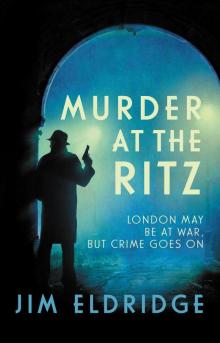 Murder at the Ritz
Murder at the Ritz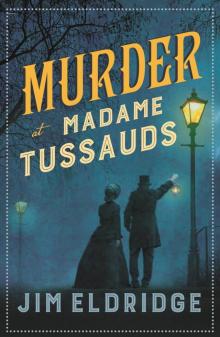 Murder at Madame Tussauds
Murder at Madame Tussauds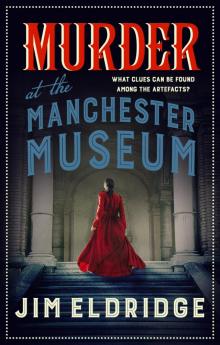 Murder at the Manchester Museum
Murder at the Manchester Museum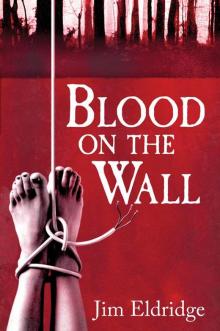 Blood On the Wall
Blood On the Wall 4.3.2.1
4.3.2.1 Jungle Kill (Black Ops)
Jungle Kill (Black Ops)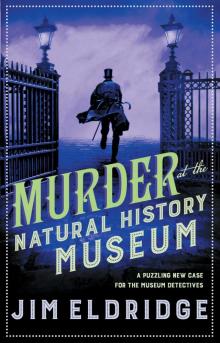 Murder at the Natural History Museum
Murder at the Natural History Museum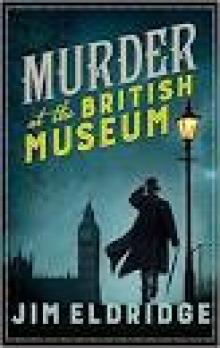 Murder at the British Museum
Murder at the British Museum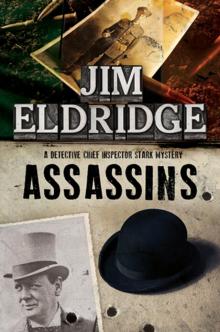 Assassins
Assassins Hunk and Thud
Hunk and Thud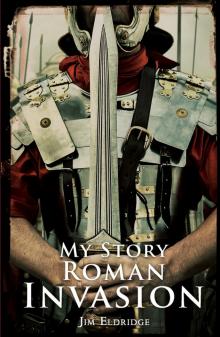 Roman Invasion
Roman Invasion Big Rock and the Masked Avenger
Big Rock and the Masked Avenger The Last Enemy
The Last Enemy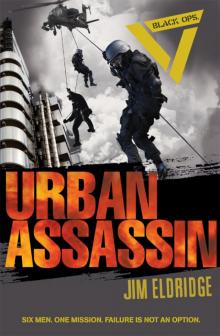 Urban Assassin
Urban Assassin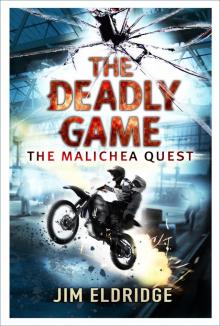 The Deadly Game
The Deadly Game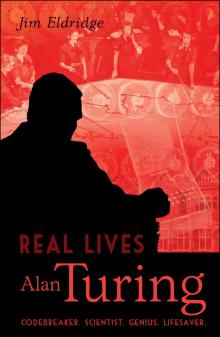 Alan Turing
Alan Turing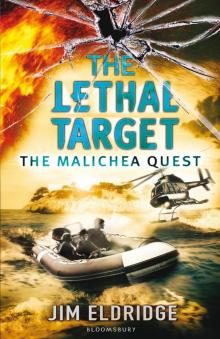 The Lethal Target
The Lethal Target The Giant Rumble
The Giant Rumble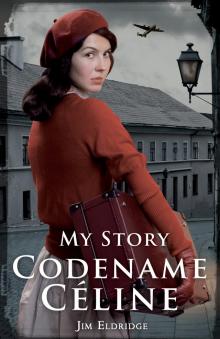 Codename Céline
Codename Céline Death in the Desert
Death in the Desert Escape from Pompeii
Escape from Pompeii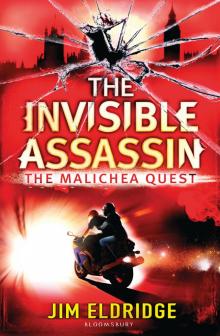 The Invisible Assassin
The Invisible Assassin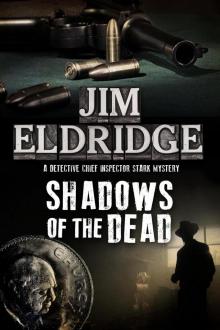 Shadows of the Dead
Shadows of the Dead Jack Versus Veto
Jack Versus Veto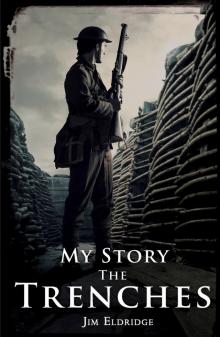 The Trenches
The Trenches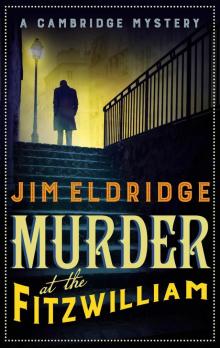 Murder at the Fitzwilliam
Murder at the Fitzwilliam Coming Home
Coming Home